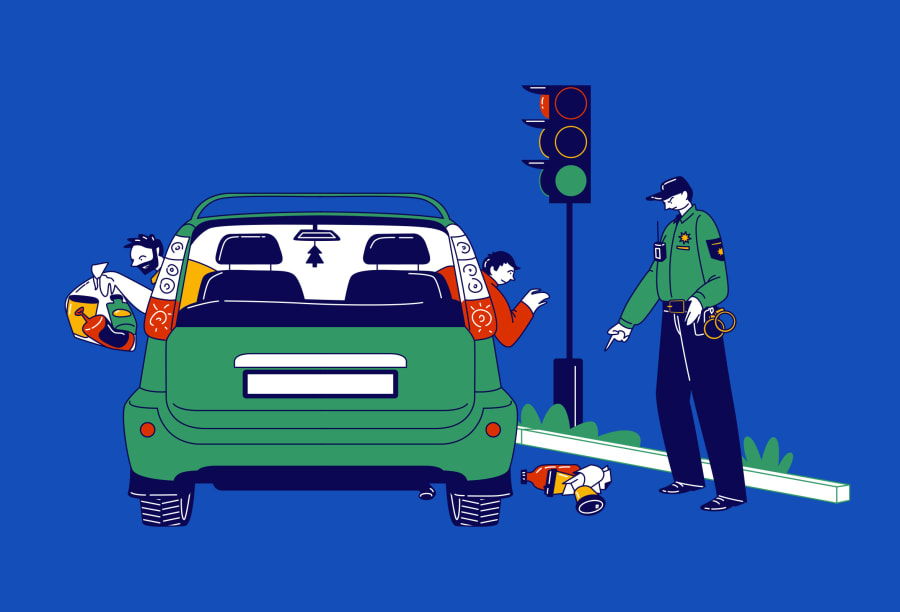6 Ways to Keep a Ticket off Your Driving Record
After a speeding ticket or other driving infraction hits your record, you'll likely see an increase in your car insurance bills — by an average of 23% after your first ticket.
But you may be able to reduce what you pay and possibly keep the ticket off your record entirely.
To avoid paying a higher insurance premium, the best way is to keep the ticket off your driving record in the first place. You can do so by contesting the citation or trying some of these other measures in court to kill the ticket.
Find Cheap Auto Insurance Quotes in Your Area
Insurance companies are not immediately notified when a ticket hits your driving record. They typically only pull your record on a yearly basis, so if the ticket is removed before that "pull" occurs, you can avoid a premium increase completely.
How to keep a ticket off your driving record
While options vary between jurisdictions, here are a few methods drivers can use to keep a ticket off of their records:
1. Take a defensive driving class
In some states, attending and passing a defensive driving course will result in your ticket being dismissed. However, this is usually a one-time-only remedy, and every state handles these courses differently.
For example, a defensive driving course in New York will reduce the number of points on your license and automatically qualify you for a 10% car insurance discount, but the ticket will remain on your record.
Defensive driving courses are available in Texas, New Jersey, California and Florida, among other states.
Cost and time commitment will vary by course, though most states now offer such courses online, to be completed at your own pace. Your local DMV should be able to provide you with a list of approved courses. You will typically need to plead guilty to the ticket in order to qualify.
2. Get a deferral
The deferral option means that, while the court finds you guilty, or you plead so, the ticket will not be added to your driving record for a certain amount of time. In most jurisdictions, it’s one year.
If you get through the deferral period without receiving another citation, the ticket will be dismissed and never hit your driving record. On the other hand, should you be issued another ticket during the period, both tickets will go on your DMV record, dramatically increasing your insurance rates. This adds some risk to the option, since it reduces your ability to fight that second ticket or eliminates it altogether.
Deferrals are not an automatic solution. A district attorney or judge must approve it, and there will most likely be a fee to pay; $100 to $300 is typical.
3. Delay
Most traffic tickets come with a court date that is at least a few months away. Asking for a continuance can kick that date down the road for almost a year. If the officer that issued the ticket is transferred, retires, quits or is fired during that time, you can ask for a dismissal. This is a last-ditch option before the courtroom options loom.
Plus, your car insurance won't increase until after you're found guilty — but your car insurance rates are usually determined by the date of the incident. So the longer you can go between the incident and your court date, the less you'll pay overall in increased insurance rates.
4. Opt for mitigation
If it’s been years since your last ticket, you may be able to ask for mitigation. While mitigation will not always keep the ticket off of your record, it could lower the fine.
In mitigation, you plead guilty but get to explain the circumstances that led to the ticket and ask the judge for leniency. With this option, there are no guarantees. The judge may accept your excuse and lower the fine.
The judge may also offer ways to keep the ticket off of your record. Deferrals or the opportunity to attend defensive driving school are common options in mitigation.
5. Contact the clerk of court
In certain jurisdictions, the clerk of court has the power to knock the ticket down to a non-moving violation. They may also be able to offer a deferral or allow you to take a defensive driving course to keep the ticket off of your record. In most cases, though, you will still have to pay the fine, along with court costs.
To exercise this option, look at your citation and find the courthouse contact information. Call this number and ask to speak to the clerk of court. In most jurisdictions, the contact information for the clerk of court is also online.
6. Contest the ticket
Contesting a ticket means that you plead not guilty and go to court to argue the ticket. You can do this by yourself or bring a lawyer. This tends to be a long-shot strategy and should be reserved for major moving violations — or one where you have clear evidence, such as dashcam footage, that you were not in the wrong.
Your best bet to keep a ticket off your record is to fight, according to the National Motorists Association (NMA). Results can range from an outright dismissal to a reduced fine. Unfortunately, most of us don’t go this route; only 5% of drivers fight a ticket.
In most cases, it’s a technicality that wins a court case. Read over your citation carefully, looking for errors. If the time, location or personal information is wrong, it can result in a dismissal.
If there isn’t an error, you will need to win over the judge with your argument. The judge will issue a verdict after you have made your case. While a dismissal or reduced fine is a possibility, if you are on the losing end, the verdict could require you to pay the full fine as well as court costs.
Tips to increase your chances in court
- Be prepared: A judge won’t rule in your favor unless you come prepared with a valid and coherent argument. Have evidence and witnesses that present your side of the situation in a positive light.
- Dress professionally: Looking professional will make a positive impression on the judge.
- Understand the rules of court: If possible, visit traffic court before your hearing so you have an understanding of how things work and observe which strategies work best.
- Always be polite: Getting mad or rude is the quickest way to a losing verdict. Always be polite and stay in control.
Editorial Note: The content of this article is based on the author's opinions and recommendations alone. It has not been previewed, commissioned or otherwise endorsed by any of our network partners.


